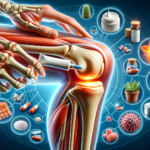Understanding Crohn’s Disease: A Brief Overview
Crohn’s disease is a chronic inflammatory condition of the gastrointestinal tract, affecting millions of people worldwide. This condition is part of a group of diseases known as inflammatory bowel disease (IBD). The exact cause of Crohn’s disease remains unknown, but it is believed to result from a combination of genetic, environmental, and immune system factors. Symptoms can vary widely among individuals, but common manifestations include abdominal pain, severe diarrhea, fatigue, weight loss, and malnutrition. Due to the unpredictable nature of the disease, managing Crohn’s disease can be challenging, requiring a multifaceted approach to treatment.
One of the Top Options for Crohn’s Disease Treatment
One of the top options for treating Crohn’s disease involves the use of biologic therapies. These therapies target specific proteins in the immune system to reduce inflammation and prevent flare-ups. Biologics have transformed the treatment landscape for Crohn’s disease by offering targeted action against the underlying immune response. They are often recommended for patients who have not responded well to traditional therapies such as corticosteroids or immunomodulators. While biologics can be highly effective, they also come with potential side effects, which must be carefully monitored by healthcare professionals.
Highly Rated Pain Relief for Crohn’s Disease
Pain management is a critical component of Crohn’s disease treatment, as abdominal pain is a common and debilitating symptom. Highly rated options for pain relief include the use of antispasmodics and certain types of analgesics. Antispasmodics help to reduce muscle spasms in the gastrointestinal tract, thereby alleviating pain. Additionally, low-dose antidepressants have been found to provide relief for some patients by altering pain perception. It is essential for patients to work closely with their healthcare providers to determine the most suitable pain relief strategy, as individual responses to treatment can vary significantly.
Dietary and Lifestyle Modifications
In addition to medical treatments, dietary and lifestyle modifications play a crucial role in managing Crohn’s disease. A well-balanced diet tailored to individual needs can help reduce symptoms and improve overall health. Common dietary recommendations include avoiding high-fiber foods during flare-ups, maintaining adequate hydration, and incorporating nutritional supplements as needed. Lifestyle changes such as regular exercise, stress management techniques, and smoking cessation can also contribute to better disease management. It is important for patients to consult with a registered dietitian or nutritionist to develop a personalized plan that supports their treatment goals.
Emerging Treatments and Future Directions
Research into Crohn’s disease is ongoing, with new treatments emerging to offer hope for patients. Advances in understanding the genetic and molecular basis of the disease are paving the way for more personalized therapies. Novel approaches such as stem cell therapy and gut microbiota modulation are being explored as potential treatments. While these emerging therapies hold promise, they are still in the experimental stages and require further investigation to establish their efficacy and safety. Patients should stay informed about new developments in Crohn’s disease research and discuss potential options with their healthcare providers.








